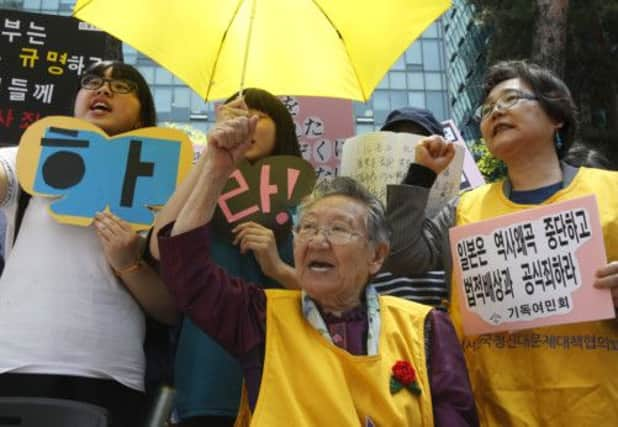Former Korean ‘sex slaves’ target Osaka’s mayor


Osaka mayor Toru Hashimoto, also co-leader of a nationalist party, enraged many last week by saying the use of so-called “comfort” women, mainly from South Korea, China and the Philippines, in frontline brothels before and during the Second World War was considered necessary to maintain discipline.
Historians say up to 200,000 women were forced to provide sex for Japanese soldiers. While other armies had military brothels, Japan is the only country accused of such widespread, organised slavery.
Advertisement
Hide AdAdvertisement
Hide AdSupporters of Kim Bok-dong and Kil Won-ok, both in their 80s, said there would be nothing to talk about because Mr Hashimoto has shown no remorse over his remarks.
Instead, they said they believed he may have wanted to use the meeting – to be broadcast live on TV – to calm public criticism. Ms Kim was recruited to work at a military uniform factory when she was 15, but ended up at a military-run brothel in Guangdong in southern China. She was dragged across Asia, from Hong Kong to Singapore and Indonesia until the end of war.
She had to take an average of 15 soldiers per day during the week, and dozens over the weekend. She and other girls were closely watched by guards and could not escape.
Hoping to help her poor family, Ms Kil took a factory job in 1940 when she was 13. However, she was sent to China, where she was repeatedly raped until the war ended in 1945.
The women, who did not appear in public, said yesterday in a statement they were heartbroken by Mr Hashimoto’s “outrageous comments” and did not want to be seen contributing to a less-than-sincere apology.
Instead, they demanded that Mr Hashimoto, 43, apologise and resign as mayor of Japan’s second-biggest city.
“We cannot compromise our painful past as victims and the reality that we still live today for Mayor Hashimoto’s apology performance,” the women said in a statement. “We don’t need to be trampled on again.”
Mr Hashimoto also angered the US by suggesting American troops based in southern Japan should patronise legal adult entertainment establishments as a way to reduce sex crimes there. He said he planned to apologise to the US military and Americans for “making them feel uncomfortable because of my inappropriate remarks,” but denied any prejudice against women.
Advertisement
Hide AdAdvertisement
Hide AdThe women, regulars at a weekly protest outside the Japanese embassy in Seoul, South Korea, and their supporters originally requested a meeting with Mr Hashimoto last year, which was rejected. He suddenly told them they could meet with him the day he made the inflammatory comments, on 13 May, Japanese supporters said. They said the timing seemed odd, and were sceptical about his motive.
Mr Hashimoto has largely shared prime minister Shinzo Abe’s view that there is no official record to prove those women were forced into sex slavery because of a state order.
Mr Hashimoto said yesterday that the cancellation was “very unfortunate” but that he respected the women’s feelings. He said he had hoped to show his sympathy over their wartime sufferings as sex slaves, and would have apologised. His comments came amid concerns in China and South Korean over a series of nationalistic events and remarks coming from Mr Abe’s government, which took power after winning elections in December.
In April, several Japanese government ministers and nearly 170 lawmakers visited Tokyo’s Yasukuni war shrine, which memorialises 2.3 million dead, including 14 leaders convicted of war crimes.